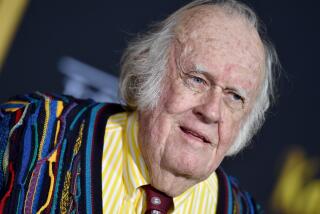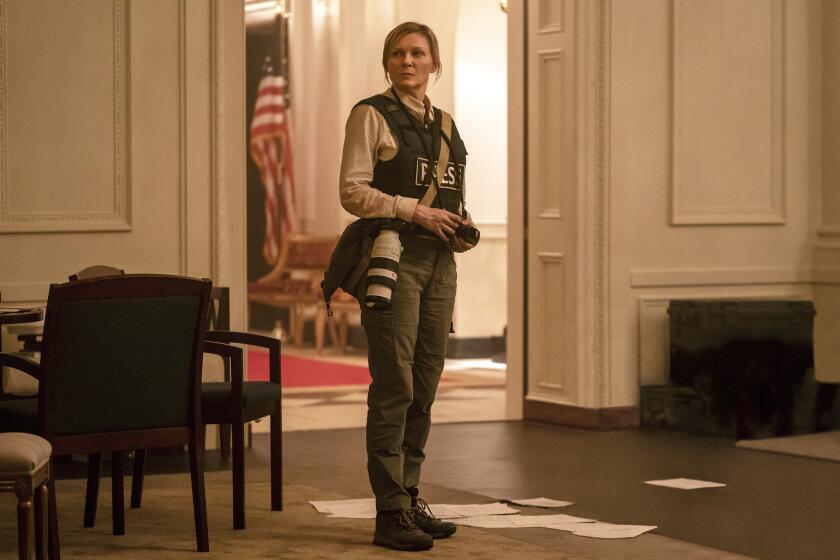Tony Scott, a man of action who brought out the best in his men
In the aftermath of director Tony Scott’s death, much has been made of the machines he filmed — the planes, trains and automobiles so sleek in his lens they became sex symbols or exploded magnificently before our eyes. What I remember are the men.
Even when I didn’t love his movies, I loved his men. Scott made them matter. The filmmaker had an uncanny ability to capture the machismo without the misogyny, and that was no small feat.
Scott’s movies were populated by strong male figures searching for a way to survive — and even evolve a little, rather than merely ride out — the feminist wave. While in brother Ridley’s hands, Thelma and Louise were hurtling into the Grand Canyon, Tony was lining up a string of ordinary guys, who ended up doing heroic things. In “Top Gun” he cracked the shell of Tom Cruise, showing a vulnerable side that helped certify the actor as a leading man and the director as worthy of note. It would ignite both of their careers.
PHOTOS: Celebrities react to Tony Scott’s death
If Tony Scott had a muse it was Denzel Washington, who starred in many of the director’s best films. More often than not, Washington portrayed a guy who did his job even when circumstances called for extreme measures, someone who stepped up when the life he saved would not be his own. “Crimson Tide,” “Man on Fire,” “Déjà Vu,” “The Taking of Pelham 123,” and “Unstoppable” were all anchored by rugged individualists who understood only too well the cause and effect that came with any decisive action.
In his first pass at film, Scott lost himself in the look itself. “The Hunger” in 1983 was a beautiful paean to Goth, with David Bowie’s vampire dripping arrogance and artifice. By the time Scott found himself in “Top Gun” three years later, the veneer had been stripped away. In Cruise’s Maverick, Scott showed us not just another side of the frat boy of “Risky Business” — though that would have been an easy play given the film’s popularity — but the more complicated and vulnerable big-screen hero the actor could be. You can see Maverick’s confidence collapse as he faces the idea of not measuring up when it counts. It still stands as one of the actor’s most authentic performances.
With all the mind-blowing pyrotechnics that the director pulled off with such skill, it is too easy to overlook the nuance he drew out of his leading men. Scott brought an intimacy to the invincible, letting the camera come in close so that none of the emotion would be lost as fear, resilience, resignation or rage played across those macho faces.
PHOTOS: Director Tony Scott dead at 68
Typical is a moment in his last film, 2010’s “Unstoppable,” a true story about an unmanned train hurtling toward disaster and the young conductor and aging engineer who try to avert it. Chris Pine and Washington are in the cab having just decided on a high-risk, last-ditch effort. Washington looks over and says, “Call your wife.” Pine shakes his head; there had been trouble at home. “Call your wife,” Washington’s character says again. The words, almost lost in the roar of the train, carry the weight of the moment perfectly — understated, unemotional, insistent.
He was at his best when Washington was in the picture. The characters the actor played are the archetype of the kind of men Scott made. At their core, and what guided all the actions that followed, was a fundamental decency. They were flawed men to be sure, some more than others, but men who accorded dignity to anyone who deserved it.
It is why the women who ended up in the company of his men were neither eye candy nor icy, but flesh and blood. Kelly McGillis’ aviation engineer in “Top Gun” could have been reduced to a stereotype, but instead she became a believable blend of intelligence, assertiveness and femininity. Paula Patton was more than just a pretty face in “Déjà vu,” and Patricia Arquette’s hooker in “True Romance” might not have been so bright but she was no bimbo either.
PHOTOS: Tony Scott’s action-packed filmography
Whether action was the sort of material Scott was naturally drawn to, or what Hollywood decided was his best game, he rarely dealt with romance. Which makes “True Romance” such a retro kick to watch. Arquette as the sweet call girl that Christian Slater’s video-store geek sets out to save, gets all of the director’s respect. There are a thousand ways her character could have been marginalized, but Scott never allowed that to happen. Whatever flaws his movies had, Scott never failed his actors.
Washington and Scott would do five films together, but it was their collaboration on 2009’s “The Taking of Pelham 123” that remains my favorite. It is an extremely interior piece of acting by Washington. His subway dispatcher, weary and wrung out by his job, his life, becomes the perfect counterpoint to John Travolta’s crazed kidnapper. It’s impossible not to be mesmerized by Washington’s face in the film — it is where Scott kept the focus — and the reward is one of the most finely attenuated studies of a man in a moment of crisis as you can find in film.
Though we may never know the details, Scott must have been a man in crisis in those final days. Whatever is learned, this is how I choose to remember him. Scott Free, the production company he formed with his brother, is branded by a short bit of animation that runs at the beginning of all their films. A man stands in the dark, a match is struck and soon he is running toward the light, trench coat flapping behind him. But then the darkness fades, the man morphs into a bird, the bird flies away. Scott free.
MORE ON TONY SCOTT
Reaction on Twitter to the director’s death
Tony Scott’s action-packed filmography
More to Read
Only good movies
Get the Indie Focus newsletter, Mark Olsen's weekly guide to the world of cinema.
You may occasionally receive promotional content from the Los Angeles Times.







